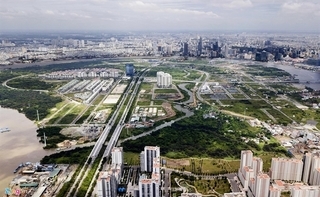 |
|
A view of the Binh Quoi-Thanh Da urban area project, which has been delayed for years, affecting more than 4,000 households.
|
Speaking at a recent meeting, Vo Van Hoan, vice chairman of the city People’s Committee, said that he had urged the Department of Planning and Architecture to instruct district authorities to review the feasibility of projects that have been delayed for years.
“The city will review all projects behind schedule, assess the capability of investors, and take back land allocated to the projects, if necessary,” he noted.
Hoan has also asked the Department of Planning and Investment to choose investors with solid financial capacity and experience in implementing major projects that will be allowed to continue.
The projects must include criteria for choosing an investor, including the amount of deposit needed for site clearance compensation and guarantees from credit institutions.
Hoan asked that the Department of Construction consider giving licences for temporary repair of homes affected by the delayed projects.
He also ordered the department to consider giving licences for construction of low-rise housing on these areas.
When residents are relocated to make way for projects, they must be compensated for the house in addition to the land, under regulations, according to Hoan.
The city government has also asked project investors to cooperate with agencies that oversee any violation of the law, including tax obligations.
In addition, all district authorities must enhance oversight of illegal splitting of land plots and transfer of land-use purposes in the districts.
Urban planning adjustments
As part of urban planning, each district every five years proposes plans or adjustments to projects in their areas.
A number of districts in the city most affected by urban planning, including Binh Thanh District, District 10 and Thu Duc, Tan Binh and Tan Phu districts, have urged the city to agree to adjust many of their original plans.
The districts’ original plans included construction of new roads, widening of existing roads, and demolishing of houses to make way for parks and other public facilities.
With such long delays, caused mostly by a lack of city funds, all districts have asked the city to abolish or adjust the plans, a few of which go back as early as 1980.
The city has agreed to all of the districts’ proposals to either abolish or adjust the original plans, and plans to offer favourable policies to residents who have been affected.
Because of the costs and low profits of such projects, districts have not been able to call for investment for some of the projects and have proposed abolishing the original plans.
According to statistics of the Department of Planning and Architecture, there are more than 14,000ha of land under these proposed areas called “mixed land” and “new residential land”.
The city People’s Committee has identified around 600 projects with licences that should be revoked because of delayed implementation.
Of the more than 2,800 licenced projects, the city is considering revoking 180 licences.
The main cause of the delayed projects is lack of agreement between house owners and investors on the compensation price, according to experts. VNS

HCM City’s transport infrastructure lags behind demand despite huge investment
HCM City allocates about US$431.9 million a year for the transport sector but the funding does not seem to be enough for narrowing the gap between the local infrastructure system and travel demand, heard at a meeting on June 10.

HCM City tightens land management
HCM City plans to tighten management of public lands and apply information technology to increase the city’s revenues, a city official said yesterday at a meeting.